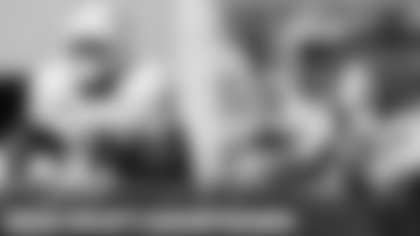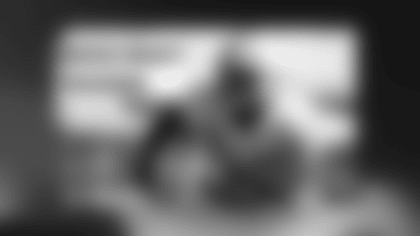Q: How much do you and your staff review situations that arise in a game, not only the last play of the game yesterday but the situation leading up to that and whether or not you could've handled anything different?
BB: Yeah, we look at all of those. We look at the ones that happened and then look at the ones that our opponents have had in previous games. They've come up and sometimes random things around the league. We have to do a better job of that. It starts with me. We've got to play better situational football. We'll work to try to achieve that.
Q: Is situational football a combination of personnel or is it a matter of the personnel that's out there needing to execute better?
BB: Well, first of all, it's understanding the situation. That's the number one thing, and then what specifically you would call in that situation. That could have a lot of variability depending on what, as you said, personnel they have in the game and various other factors. Understanding what are the critical parts of each situation and then applying the specific call that's made to that. It's a combination of a lot of things. As I said, I've got to do a better job with it.
Q: How much consideration did you put into going for it on fourth-and-4 on your final offensive possession as opposed to kicking the field goal for the five-point lead?
BB: Yeah, we talked about it. I felt like the points to make it a touchdown instead of a field goal game – that changes the whole thing. Like what happened in the Pittsburgh game yesterday, needing a touchdown and needing a field goal. I think that's significant. But, you know, you could make an argument for doing it the other way I guess, if you want to.
Q: What is Rob Gronkowski giving you in that situation on the last lateral play that makes him the choice to be on the field there?
BB: It would be his ability to play the deep, long throw.
Q: Is that a Hail Mary throw even though that throw might not be able to reach the end zone? Or were you thinking that the end zone was a possibility there?
BB: I think it was a little too far to get to the end zone, but certainly a deep pass in that situation is a possibility. I wouldn't rule that out.
Q: Did you give much thought to going with a regular pass defense on the final play as opposed to the Hail Mary prevent defense?
BB: No.
Q: Why was Devin McCourty the choice to not be on the field for the final play despite being one of your faster players and better tacklers?
BB: Yeah, that's the way we substituted that group.
Q: In hindsight, do you wish you had him on the field for that play?
BB: Well, I think there's a lot of things that could've been better on that play. I think there were a lot of things that could've been better in the entire game. I think the game was about a lot more than that play, but certainly that play wasn't a good one for us.
Q: Do you have a defense or substitution package that is specifically designed to combat those hook-and-lateral types of plays as opposed to just preventing a long Hail Mary throw to the end zone?
BB: Yeah, so what's the question? To play both plays? Yeah, that's the idea, is to be able to play both plays.
Q: Ryan Tannehill was never going to be able to reach the end zone from where they were located at the start of the play. Was there thought given to putting somebody else out there besides the tight end?
BB: Yeah, I just said, Tom [Curran], there's a lot of things that could've been better on that play.
Q: How do you coach it up as a staff trying to balance being aggressive as tacklers versus also defending against a potential lateral or toss backwards in that situation?
BB: Look, when the offense snaps the ball, there are a lot of different things they can do on every play. So, when you're on defense you have to defend everything, all of the things that can happen, all of the eligible receivers out there and wherever they're placed and so forth. That's the way it is on every play. You're not just defending one play.
Q: Is the role that Albert McClellan has carved for himself been pretty much what you expected when you signed him a few weeks ago?
BB: Well, Albert has multiple roles defensively and in the kicking game and he's done a good job since he's been here. He's been a solid addition for us. He had two big plays yesterday on the punt blocks. But, you know, he's done a lot of other good things for us, too.
Q: How encouraging was it for you to see the spike in production from Rob Gronkowski in the passing game, finishing with eight catches for 107 yards?
BB: Well, wherever the opportunities come, it's always good to see production. You can't always control who's going to get those opportunities or when or where they're going to come. But when they do, it's great to see it from everybody or anybody who gets it; anybody and everybody.
Q: On your second-to-last offensive series of the first half, with about two minutes to go, the offense seemed content trying to check the ball down to James White and eventually punt back to Miami. Was that the thought process there, or was there going to be a concerted effort to try and move the ball down the field and put yourselves in position to score?
BB: Well, right. Yeah, we didn't because we didn't get a first down.
Q: Was the hope that after not picking up the first down on the early downs, that you would be able to erase enough time off the clock so that Miami would have a lesser chance to move the ball down the field themselves?
BB: Yeah, well the main thing in that situation was to get the first down which we didn't do. We had three timeouts. With a minute and a half and three timeouts, or whatever it was, I mean that's plenty of time for us to be able to stop right there. I didn't feel like that was a big restriction. What was a restriction was that we had to punt the ball back because we were stopped on third down.





























